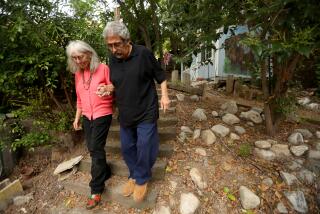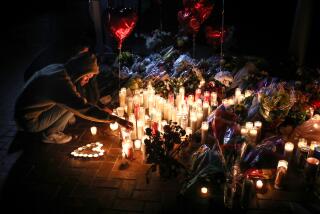Restoring Faith
- Share via
Mildred Still calls her youngest daughter “Momma.”
Usually, she doesn’t make a sound at all, except for the crying fits caused by Alzheimer’s disease, which slowly, insidiously is destroying her.
She is disoriented and can no longer perform the most mundane tasks without help. She requires a wheelchair and hasn’t the strength to open her eyelids most days.
But at a nondenominational church service held Saturday for Alzheimer’s patients and their families, Still, 82, recited every word of “The Lord’s Prayer.” She received communion. And when a minister, who also is her nephew, kissed her on the cheek, her eyes popped open wide.
Such spiritual reawakening has caught the notice of researchers who believe that faith can be therapeutic for even those who have lost their cognitive abilities.
Just as others who suffer from dementia can conjure memories from decades past, Alzheimer’s patients can sing a hymn or quote a Biblical verse that they learned long ago. Doing so, researchers have found through observation, can make patients less agitated.
“Even quite late in the disease, they can still receive comfort and pleasure in spirituality,” said Malcolm Dick, a neuropsychologist with the Alzheimer’s Disease Diagnostic and Research Center. It is part of UC Irvine’s Institute for Brain Aging and Dementia.
Yet the cruelty of the disease often separates its victims from their spirituality.
In Alzheimer’s early stages, patients sometimes withdraw from religious activities because they are embarrassed about their memory loss or don’t know how to react, advocates said.
Families too are hesitant to take Alzheimer’s patients to a church, synagogue or other houses of worship because of the involuntary, inappropriate behavior that people with the disease exhibit.
“So the place people normally turn to for spiritual guidance is cut off,” said Linda Scheck, the executive director of the Alzheimer’s Assn. of Orange County.
“But when you have a spiritual need to connect, the services, the songs, the hymns, the prayers, the smell of incense, all the rituals can be called up” from memory, she said.
The 30-minute service at St. Matthew Church in Orange had five hymns and several prayers in addition to a homily. Organizers said it was the first service in Orange County exclusively for people with Alzheimer’s disease or other forms of dementia and their families. Similar services have been performed nationwide since 1992.
Scheck said the Alzheimer’s Assn. is planning another service, but details haven’t been finalized.
Don Elliott of Yorba Linda brought his 98 1/2-year-old father, Homer, to the service even though the former minister and military chaplain doesn’t have Alzheimer’s disease. But he’s legally blind, nearing deafness and suffers grave memory lapses.
Elliott said he hoped his father recalled some memories of his professional religious background. And there was another reason for Elliott’s father to leave his Placentia group home.
“It does him good to get out,” Elliott said.
Because people often turn to religion in times of trouble, the Orange County association is inviting 600 county religious leaders to a luncheon next month to talk about what they can do if members of their congregations are diagnosed with Alzheimer’s.
The degenerative brain disease was discovered in 1907, but it wasn’t until the last 20 years that people began to realize that dementia wasn’t a normal part of aging. Still, the risk of getting Alzheimer’s increases with age; between 33% and 48% of those 85 or older will be affected, Dick said.
The disease is diagnosed only years after symptoms first occur, and there is no cure. But two drugs, tacrine and donepezil, have been approved to treat the disease, and an estimated 50 others are being studied.
*
During the church service, Denise Rupp rocked her mother’s wheelchair, stroked her hair and fed her communion. Mildred Still was diagnosed with Alzheimer’s five years ago, but Rupp, the youngest of four daughters, said her mother showed signs of the disease as early as 15 years ago.
“In all these years, I’ve tried to provide the best for her care, but there was always something missing,” said Rupp, 45. “Then I realized it’s the spiritual side. The only thing I can’t give her is peace.”
More to Read
Sign up for Essential California
The most important California stories and recommendations in your inbox every morning.
You may occasionally receive promotional content from the Los Angeles Times.









